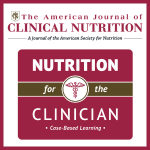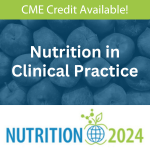
Nutrition for the Clinician: A Perfect Storm in a Pandemic - A Child with Complex Medical History and Special Diet Encounters COVID
To educate physicians and other health professionals on the fundamentals of nutrition, The American Journal of Clinical Nutrition launched a new article series titled Nutrition for the Clinician. The effort supports the White House National Strategy on Hunger, Nutrition, and Health and its directives to expand nutrition knowledge of health care providers. Through case-based learning, Nutrition for the Clinician provides continuing education that enhances clinical reasoning and use of the best nutrition evidence in practice. Each clinical case will feature a clearly identified nutrition problem and defined learning objectives and be published in the journal’s regular issues periodically throughout the year.
Titled A Perfect Storm in a Pandemic – A Child with Complex Medical History and Special Diet Encounters COVID, the inaugural case highlights a six-year-old child with under nutrition and acute COVID-19 infection. Authors Nancy Krebs, MD and Stephanie Waldrop, MD of the University of Colorado provide medical history, laboratory results, and clinical findings and offer commentary and questions to guide readers through the case. The authors analyze the differential diagnosis and treatment considerations at the outset and reassess them as new data emerges over the course of care.
Click here to access this article.
Statement of Need
Research has indicated that nutrition is minimally addressed in medical schools and residency programs. Many physicians recognize this gap and seek ways to improve their knowledge, competence, and practice in this area.
Learning Objectives
- Recognize the clinical presentation of kwashiorkor and multiple micronutrient deficiencies in a non-resource limited setting
- Describe the pathophysiologic consequences of kwashiorkor in combination with severe infection
- Describe the clinical management of a patient with kwashiorkor, delineating potential complications and how these can be avoided
Keywords
- Kwashiorkor
- Micronutrient deficiency
- Zinc deficiency
- Malnutrition
Target Audience
Directed to physicians, dietitians and advanced practice providers who wish to advance their knowledge of nutrition and skills to incorporate nutrition into medical practice, and keep current with developments in nutrition science.
Disclosure Policy
The American Society for Nutrition supports fair and unbiased participation of individuals in its education activities. Any real or potential conflicts of interest must be identified and managed. All relevant financial relationships with commercial interests that directly impact and/or might conflict with ASN activities must be disclosed, or disclosure that no relevant financial relationships exist must be documented. Other relationships that could cause private interests to conflict with professional interests must also be disclosed. This policy is intended to openly identify any potential conflict so that participants in an education activity are able to form their own judgments about the presentation. In addition, disclosure must be made of presentations on drugs or devices or uses of drugs or devices that have not been approved by the Food and Drug Administration.
Faculty
Christopher Duggan, MD, MPH (Boston Children’s Hospital) has received grant/research support from Takeda. All relevant financial relationships have been mitigated.
The following individuals had editorial and/or administrative roles and have no relevant financial relationships with ineligible companies to disclose: Cora Best, PhD, MHS, RDN (University of Florida); Nancy Krebs, MD (University of Colorado System); Mark Manary, MD (Washington University in St. Louis School of Medicine); Stephanie Waldrop, MD, MPH (University of Colorado, Anschutz Medical Campus and Children’s Hospital Colorado); and Gwen Twillman (ASN Staff).
Accreditation Statement
This activity has been planned and implemented in accordance with the accreditation requirements and policies of the Accreditation Council for Continuing Medical Education (ACCME) through the American Society for Nutrition (ASN). The American Society for Nutrition is accredited by the ACCME to provide continuing medical education for physicians.
Credit Designation
Physicians
The ASN designates this journal CME activity for a maximum of 1.0 AMA PRA Category 1 Credit™. Physicians should claim credit commensurate with the extent of their participation in the activity. The certificate you receive upon completion of this education activity will list the amount of continuing medical education credit you were awarded. Please use this documentation for your CME licensing or certification needs.
Learners seeking CME credit are required to pass a post-test assessment of subject matter comprehension. To pass the post-test assessment, learners must correctly answer 80% of the questions.
Non-physician Professionals
For registered dietitians, the Commission on Dietetic Registration (CDR) recognizes enduring educational activities offered by ACCME accredited providers. For any additional questions, participants can contact CDR at [email protected].
ASN does not offer CME credit to non-physicians. However, all non-physician professionals will be able to complete an evaluation and download a Certificate of Participation. This certificate designates your participation in this education activity. It lists the amount of continuing medical education credit that has been designated for physicians by ASN. You should be able to use this documentation for your licensing or certification needs. To determine if activities designated for AMA PRA Category 1 Credit™ are acceptable for your licensing or certification needs, please contact your credentialing body directly. Please note ASN cannot guarantee its acceptance.
Learners seeking a Certificate of Participation are required to pass a post-test assessment of subject matter comprehension. To pass the post-test assessment, learners must correctly answer 80% of the questions.
Method of Participation
To claim credit or download a certificate, learners must read the activity and complete the online post-test assessment and evaluation. A score of 80% on the post-test assessment must be achieved.
Commercial Support
There is no commercial support for this activity.
Available Credit
- 1.00 AMA PRA Category 1 Credit™
This activity has been planned and implemented in accordance with the accreditation requirements and policies of the Accreditation Council for Continuing Medical Education (ACCME) through the American Society for Nutrition (ASN). The American Society for Nutrition is accredited by the ACCME to provide continuing medical education for physicians.
The ASN designates this activity for a maximum of 1.00 AMA PRA Category 1 Credit™. Physicians should claim credit commensurate with the extent of their participation in the activity.
- 1.00 Certificate of Participation
ASN does not offer CME credit to non-physicians. However, all non-physician professionals of this activity will be able to complete an evaluation and download a Certificate of Participation. This certificate designates your participation in this education activity. It lists the amount of continuing medical education credit that has been designated for physicians by ASN. You should be able to use this documentation for your licensing or certification needs. To determine if activities designated for AMA PRA Category 1 Credit™ are acceptable for your licensing or certification needs, please contact your credentialing body directly. Please note ASN cannot guarantee its acceptance.

 Facebook
Facebook X
X LinkedIn
LinkedIn Forward
Forward
